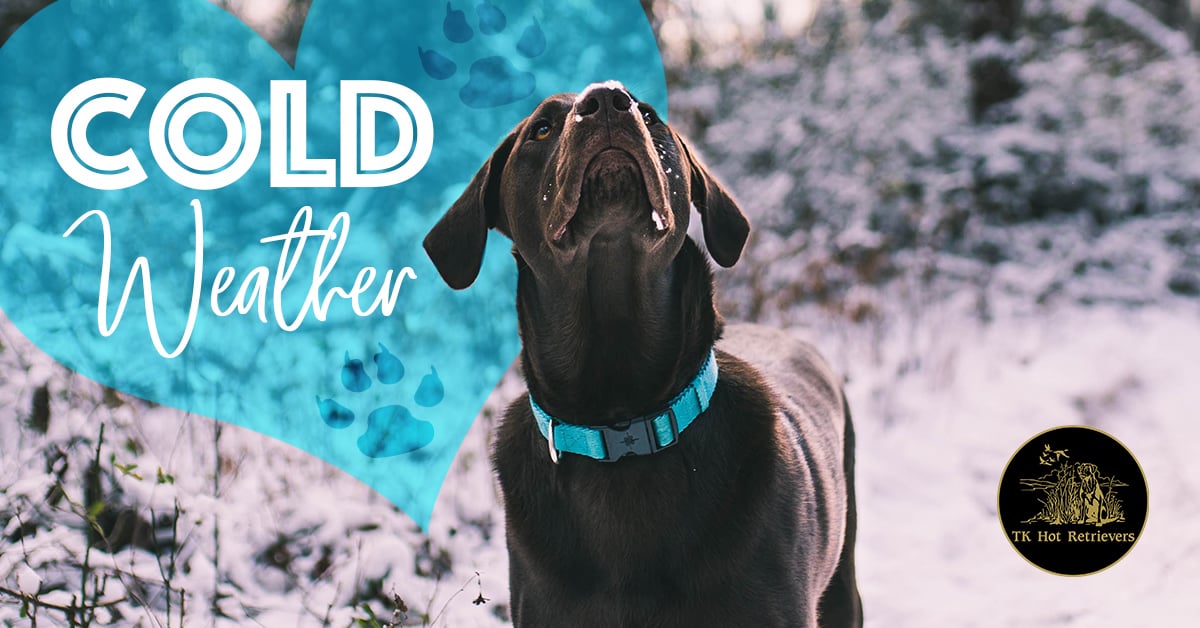Why Labs Love the Cold Weather

As you would with any other dog, you want to ensure they’re safe and healthy. When temperatures rise to a scorching point or drop to freezing, you’ll probably wonder about your dog’s safety in those conditions. If you have a Lab, you may have noticed they enjoy being outside even when it’s frigid. Why does your pooch do this? Is it safe? Should you be concerned? All of those questions we’ll answer below and hopefully give you some peace of mind as a pet parent.
Labs Are Designed for the Cold
To start, it’s essential to know the origin of the Labrador Retriever. If you didn’t already know, Labs were bred with thick coats to help them comfortably withstand the cold. Newfoundland, where Labs originate from, never gets warmer than about 60 degrees in the summer. During the winter, it has an average daily temperature of about 32 degrees. When they were working dogs in this Canadian Province, their thick, water repellent coat helped fishers. They dragged nets out of the water and pulled ropes from one ship to another. And on land, these Labs would frequently hunt fowl.
So, due to these extraordinarily harsh and low temperatures, these fishermen needed canine companions who could withstand the cold and help them. Which is precisely what the Labrador Retriever was bred to do.
Don’t Forget About Their Double Coat
As mentioned above, Labs were working in cold conditions near a lot of water – which is where their unique coat comes into play. Labradors have a short, thick, and water-repellent double coat that once helped them withstand the freezing weather and icy water they worked in almost every day.
If you’re the owner of a Lab, then you’ve probably noticed their shedding at various times of the year. Now while this can be frustrating and create a lot of clean up, it’s the exact reason why Labs do so well in the cold. Their two fur layers, the topcoat & undercoat, create a sort of insulation for them and their body heat.
It’s almost like your pup is wearing a fancy fur coat OVER their already furry body. So it may not be that your Lab is in love with the cold but instead that they’re more comfortable being in it.
Is There Such a Thing as Too Cold?
Absolutely there is such a thing as too cold. Your Labrador isn’t invincible, and there is a limit to how much cold they can withstand. Generally, your Labrador can tolerate temperatures down to about 20 degrees – but not every dog is the same.
If your pup hasn’t been to the vet recently and doesn’t have a clean bill of health, the cold could irritate and worsen any conditions they’ve developed. If your canine is healthy, then ensure they’re consuming plenty of water and food (maybe even a bit extra) when it’s cold out. Those extra calories will be converted into energy that will support your Lab in staying warm.
Another good rule of thumb to follow is if it’s too cold for you, then it’s too cold for Fido. If you’re not quite sure, then keep an eye on them while they’re outside, so you don’t accidentally forget they’re out there.
Some Cold Weather Safety
Once again, even though your Labrador was bred for the cold – they’re still susceptible to some severe weather hazards. Shivering is a huge indicator that your pup is ready to go inside. Pay careful attention to their ears, feet, and tail for signs of frostbite. If you notice Fido has any skin discoloration, swelling, blistering, or is obviously in pain – these could be vast indicators of frostbite.
When your pup comes inside, be sure to check their paws and wipe them off. Dangerous deicers and rock salt can irritate your Lab’s paws. Possibly consider applying paw balm or putting on doggy booties before you let your dog out.
Remember, just because your Lab can survive freezing temperatures doesn’t mean they should be exposed to them for long periods. If you ever suspect something is wrong with your pooch after being out in the cold – contact your vet asap. This will help you know if it’s either nothing to worry about or something serious that needed to be brought to their attention. Always play it safe rather than sorry when it comes to your canine companion.